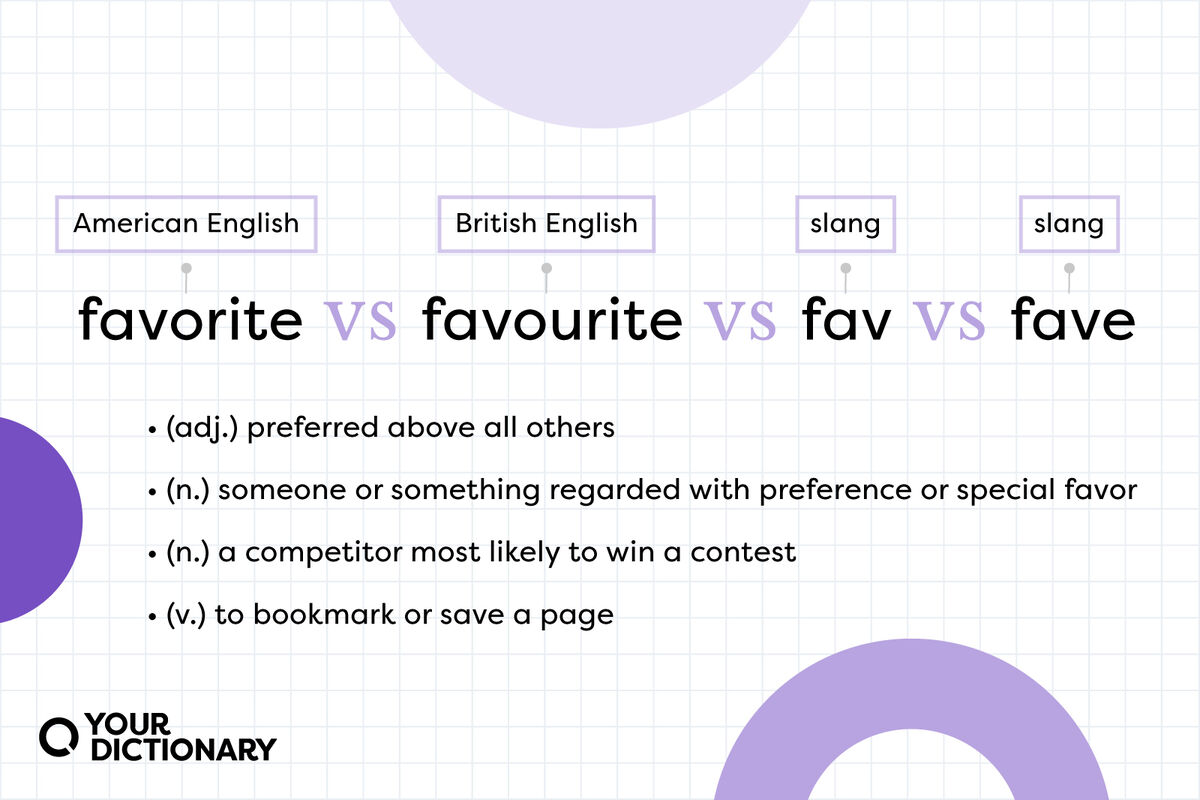
We all have our favorites, from color to flower to shape of nugget. (For the record: blue, poppies, and dinosaur.) Favorites are an easy way to start conversations and develop almost immediate connections with other people. However, depending on where you live, you might know it better as favourite than favorite. They still have the same definition, but it’s worth knowing why there are two spellings for the same thing.
How To Spell "Favorite": With or Without a "U"?
Rest assured that both favorite and favourite are correct. They both mean the same thing and can be used the same ways. Whether you add in that “U” comes down to where you live. American English favors favorite, while favourite is more commonly used in British English.
You might find some slight variations, but that’s how it shakes out. Note that British English includes more than just the U.K., meaning countries like India, Australia, and Canada are more likely to use favourite.
The Word Origins of “Favorite” and “Favourite”
Favorite and favourite are French in origin. They come from the Old French word favorit, equivalent to the (extremely fun) word favorito from Italian, Spanish, and Portuguese.
Where did that “U” come from? It’s actually hard to really tell. The main theory is that, much like the words colour and moustache, it was a way for the British to honor or maintain the word’s French roots. Though that doesn’t make a lot of sense, considering the French form doesn’t have a “U.”
Other theories suggest that favourite was actually the preferred spelling among all English speakers. However, as America increasingly tried to separate itself from Britain (physically and linguistically), one Noah Webster (you know, the dictionary guy) eliminated that “U.”
What Does “Favorite” or ”Favourite” Mean?
Despite that extra “U,” favorite and favourite have the same meaning, and despite what you might think, favorite and favourite have more definitions in more parts of speech than you probably realize.
“Favorite” and “Favourite” As Adjectives
Most commonly, favorite and favourite act as adjectives to describe “something you prefer above all others.”
- This is her favorite pizza place in the whole city.
- Don’t get mad, but I accidentally spilled pizza sauce on your favourite shoes.
“Favorite” and “Favourite” As Nouns
Favorite and favourite also come in noun forms, meaning “someone or something regarded with preference or special favor.”
- This soda is a favorite of mine.
- Collecting wooden spoons that look like celebrities is his favourite.
Both favorite and favourite also act as nouns, meaning “a competitor most likely to win a contest.”
- That politician was the clear favorite in the election.
- Although he didn’t get enough MVP votes, he was the favourite among the fan votes.
“Favorite” and “Favourite” As Verbs
A fairly new usage of favorite and favourite sees it as a verb that's typically reserved for social media and digital technology. As a verb, favorite and favourite can mean “to bookmark or save a page.” Twitter oldheads will also remember that “liking” tweets was initially “favoriting” tweets.
- I made sure to favorite that good site featuring dogs wearing Halloween costumes.
- She favourited my post as a means of stealthy flirting.
In Modern Form: "Fav" vs. "Fave"
One of the coolest things about language is how it changes based on cultural shifts. Remember that Twitter favoriting/favouriting thing? Those were also known as favs or faves. Fav and fave (both pronounced “fayv”) are abbreviations of favorite or favourite, and they both predate Twitter (and the internet in general).
Fav initially appears to have been in usage by 1935 and was used as a noun specifically in horse racing to describe “the projected winner of a race.” This also included the variation fav. with a period at the end.
Fave was in usage by at least 1938 when it appeared in Variety magazine. Fave was used in both noun and adjective forms, though unlike fav, fave was mainly reserved for show business.
Should You Use “Fav” or “Fave”?
Today, fav and fave are largely interchangeable as slang shortenings of favorite or favourite. They both mean the same thing, and your choice mostly comes down to personal preference.
- One of my favs sent me a slice of chocolate cake.
- A fave tradition for my family is eating too many dumplings on New Year’s Day.
Some argue that fav is the true abbreviation as the written word favorite doesn’t have an “E” after the “V.” However, fave might be more helpful in getting across the pronunciation. If we’re going by search trends, most people seem more interested in fave than fav. If you want to save yourself a character, use fav.